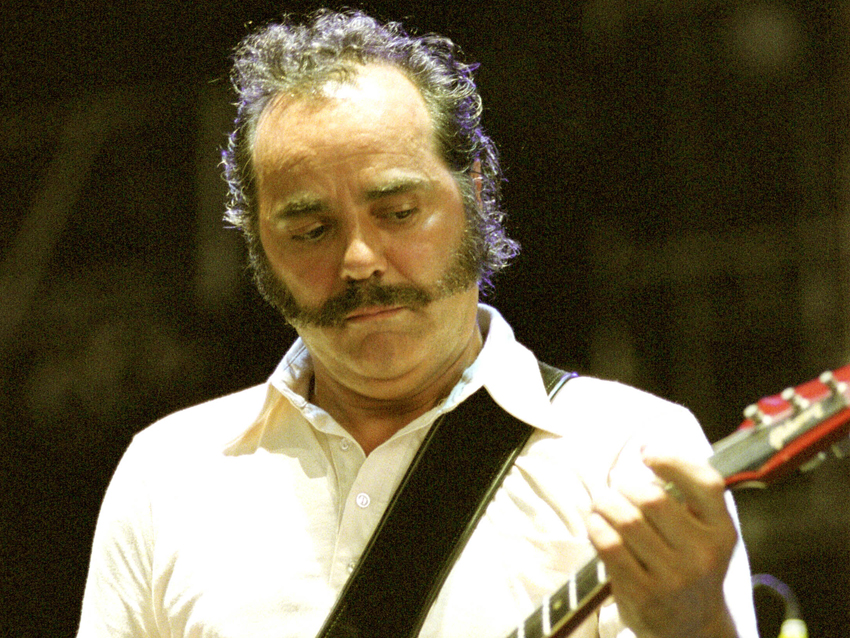
Neil Young is already drawing rave reviews for his upcoming album, Le Noise (due out 27 September in the UK and the following day in North America). Recorded solo, without a band - no Crazy Horse or other backing players - and devoid of overdubs, it's a jarring and soul-stirring eight-song journey into the wonders of sound.
"You listen to Neil play the guitar and sing a song, and all you can do is be drawn in," says producer Daniel Lanois, whose maverick sonic imprint has been left on some of the finest works by U2, Peter Gabriel and Bob Dylan, among others. "He's one of those rare guys who can just rattle your insides when his hand hits the strings."
Originally, the album was to be be an all-acoustic solo affair. "I sat on the couch in Neil's manager's office and listened to Neil play me a couple of songs," says Lanois. "They were great, but they weren't fully formed. But with Neil, you start to imagine what will be there, so my mind began filling in the blanks, and I was thinking of all the sonic possibilities."
Over the course of four sessions ("brilliant, moonlit nights," says Lanois), the record took shape, and it didn't take long for electric guitars to come out. "Neil and I bonded over our love and enthusiasm of amps," says Lanois. "I have a great collection of Fender Tweed Deluxes from the '50s, and I think when I suggested pulling out an electric guitar or two, Neil got excited about hearing what those amps could do."
According to Lanois, Young's late '50s Gretsch White Falcon was the bedrock of the album's electric sound. "It's a really interesting guitar because of its split pickup, which allows the bass strings to come out of one amp while the top strings can come out of another. So already, without me trying to manipulate the signal, you get a really cool, unique sound out of the guitar."
On the song Hitchhiker, however, Young's famed 'Old Black' Les Paul makes an appearance. "That's some guitar," says Lanois. "Neil starts playing that and you go, 'Oh yeah, that's him!' It's got a meaty, grungy, gnarly presence, whereas the Gretsch has more midrange and clarity to it. Both guitars sound great through those Tweeds."
Although Young is famed for his frenzied, minimalist solos, the guitarist eschews such fretboard star-turns on Le Noise. "Neil plays brilliant solos, but they wouldn't fit the spirit of these songs," says Lanois. "This is a riff-based album."
Get the MusicRadar Newsletter
Want all the hottest music and gear news, reviews, deals, features and more, direct to your inbox? Sign up here.
Once Young was finished with his performances, Lanois set about "adding my sonics and seeing where the music took me." Calling himself a bit of an "old-school and new-school guy" when it comes to gear, the producer says one item is essential to his recordings: "I still use my AMS Harmonizer. It's a late '70s box, but I consider it irreplaceable. It has a great VCO and a great reverb in it. I don't keep it at any fixed settings, however - I like to use it like an instrument."
Joe is a freelance journalist who has, over the past few decades, interviewed hundreds of guitarists for Guitar World, Guitar Player, MusicRadar and Classic Rock. He is also a former editor of Guitar World, contributing writer for Guitar Aficionado and VP of A&R for Island Records. He’s an enthusiastic guitarist, but he’s nowhere near the likes of the people he interviews. Surprisingly, his skills are more suited to the drums. If you need a drummer for your Beatles tribute band, look him up.

"It may have bothered him that people didn’t recognise his guitar virtuosity, which might be why the song devotes so much space to his shredding": A music professor breaks down the theory behind Prince's When Doves Cry

“It didn’t even represent what we were doing. Even the guitar solo has no business being in that song”: Gwen Stefani on the No Doubt song that “changed everything” after it became their biggest hit
Most Popular








